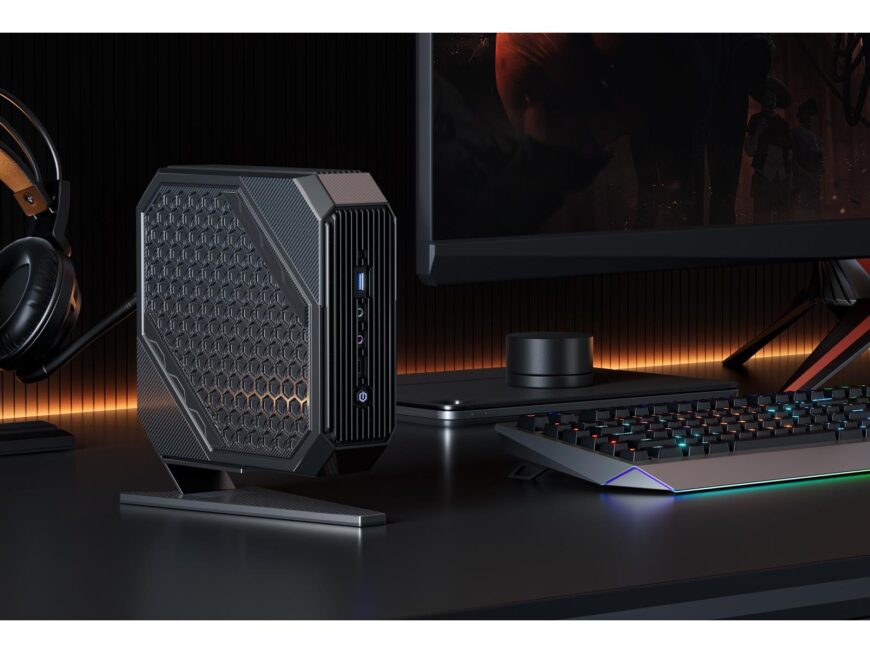In an era marked by technological advancements and the ever-shrinking size of electronic devices, the future of computing is steadily moving towards compact solutions.
With their diminutive size and robust capabilities, Mini PCs are poised to play a significant role in shaping the future of computing.
Miniature Personal Computers (Mini PCs) are emerging as a remarkable trend, revolutionizing the way we perceive and utilize computing power.

The Rise of Mini PCs: A Compact Powerhouse
Mini PCs are a category of small-form-factor computers that deliver a full-fledged computing experience in a compact package.
These devices encompass the essential components of a traditional PC, including processors, memory, storage, and connectivity options, all integrated within a tiny enclosure.
The concept of Mini PCs was initially driven by the need for space-efficient computing solutions, but their capabilities have expanded far beyond their size.
From Niche to Mainstream
Over the past few years, Mini PCs have evolved from being niche gadgets to mainstream computing alternatives.
The surge in demand for portable and space-saving devices, coupled with advancements in technology, has catalyzed the popularity of Mini PCs.
These devices are no longer limited to basic tasks; they are now capable of handling resource-intensive applications, such as multimedia editing, gaming, and even virtual reality experiences.
Key Factors Shaping the Future of Mini PCs

1. Performance and Efficiency
As technological innovation continues, the processing power and energy efficiency of computer components are on an upward trajectory.
The future of Mini PCs hinges on their ability to incorporate the latest processors and graphics solutions while maintaining low power consumption.
This will enable users to experience seamless multitasking and responsive computing without compromising on portability.
2. Connectivity and Versatility
The Mini PCs of tomorrow will be defined by their connectivity options.
With the proliferation of high-speed wireless technologies like 5G and Wi-Fi 6, Mini PCs can serve as versatile hubs for data transfer and communication.
Their compact size makes them ideal candidates for IoT (Internet of Things) integration, enabling them to control smart devices seamlessly.
3. Design and Aesthetics
Aesthetics will play a pivotal role in the evolution of Mini PCs. Manufacturers will focus on creating visually appealing devices that blend seamlessly into various environments, whether it’s a minimalist home office setup or a futuristic workspace. Customizability through interchangeable components and modular designs might also become a trend, allowing users to tailor their Mini PCs to their preferences.
4. AI Integration

Artificial Intelligence (AI) will likely find its way into Mini PCs, enhancing their capabilities and user experience. AI-driven features could include adaptive performance optimization, voice recognition, and even predictive maintenance, ensuring that the Mini PCs of the future are not only smart but also self-sustaining.
5. Environmental Considerations
As sustainability takes center stage, the future of Mini PCs will likely focus on eco-friendly designs and materials. Efforts to reduce electronic waste, enhance recyclability, and minimize energy consumption will influence the development of these devices. Additionally, energy-efficient components and manufacturing processes will contribute to a greener computing landscape.
Applications and Use Cases
1. Home and Office Computing

Mini PCs are already a popular choice for home and office environments due to their space-saving nature. In the future, their compact size and performance capabilities will make them even more appealing for tasks like web browsing, document editing, and multimedia consumption.
2. Gaming and Entertainment
Gaming enthusiasts will benefit from Mini PCs tailored for gaming experiences. These devices will provide the power needed for graphically demanding titles, all while maintaining a small footprint. Additionally, Mini PCs can serve as entertainment centers, streaming 4K content to TVs and monitors.
3. Edge Computing
The rise of IoT and edge computing will position Mini PCs as essential components of decentralized computing networks. Their compact size, coupled with AI capabilities, will allow them to process and analyze data locally, reducing latency and enhancing real-time decision-making in various industries.
4. Healthcare and Telemedicine
The healthcare industry stands to benefit from Mini PCs in numerous ways. These devices could serve as portable medical stations, enabling healthcare professionals to access patient records, review medical images, and conduct virtual consultations on the go. Mini PCs with advanced AI capabilities could assist in diagnosing medical conditions and analyzing large datasets, contributing to faster and more accurate treatment decisions.
5. Education and Digital Learning

In the realm of education, Mini PCs have the potential to revolutionize digital learning. With their compact size, schools and educational institutions can distribute these devices to students for remote learning. Equipped with interactive touchscreens and stylus support, Mini PCs could facilitate collaborative learning experiences and personalized education.
6. Automotive and Transportation
As the automotive industry embraces autonomous driving and connected vehicles, Mini PCs could find their way into cars and other modes of transportation. These devices could power infotainment systems, navigation tools, and advanced driver-assistance systems (ADAS). Mini PCs integrated with sensors and AI algorithms could enhance vehicle safety and performance.
7. Retail and Point-of-Sale Systems
Retail businesses could benefit from the compact footprint of Mini PCs for point-of-sale (POS) systems. These devices could handle transactions, inventory management, and customer interactions in a streamlined manner. With wireless connectivity and secure payment options, Mini PCs could enhance the efficiency of retail operations.
8. Scientific Research and Field Work

Researchers and scientists often work in challenging environments, conducting experiments and data collection in the field. Mini PCs could serve as portable research tools, assisting in data analysis, simulations, and real-time monitoring. Their rugged design and adaptability make them ideal companions for scientific exploration.
9. Digital Signage and Advertising
Mini PCs with high-resolution displays could power digital signage and advertising displays in various settings. From malls and airports to public transportation, these devices could deliver dynamic content, advertisements, and information to engage audiences effectively.
10. Artificial Intelligence and Machine Learning Development
In the realm of technology development, Mini PCs could become platforms for AI and machine learning experimentation. Developers and researchers could utilize these devices to train and test models, accelerating the advancement of AI applications across industries.
Conclusion
The future of Mini PCs holds great promise, with advancements in performance, connectivity, design, and sustainability poised to redefine computing norms. As these compact powerhouses continue to evolve, they will find their place in an array of applications, from personal computing to industrial automation. With each innovation pushing the boundaries of what’s possible in such a small package, Mini PCs are set to play a significant role in shaping the future of technology.




